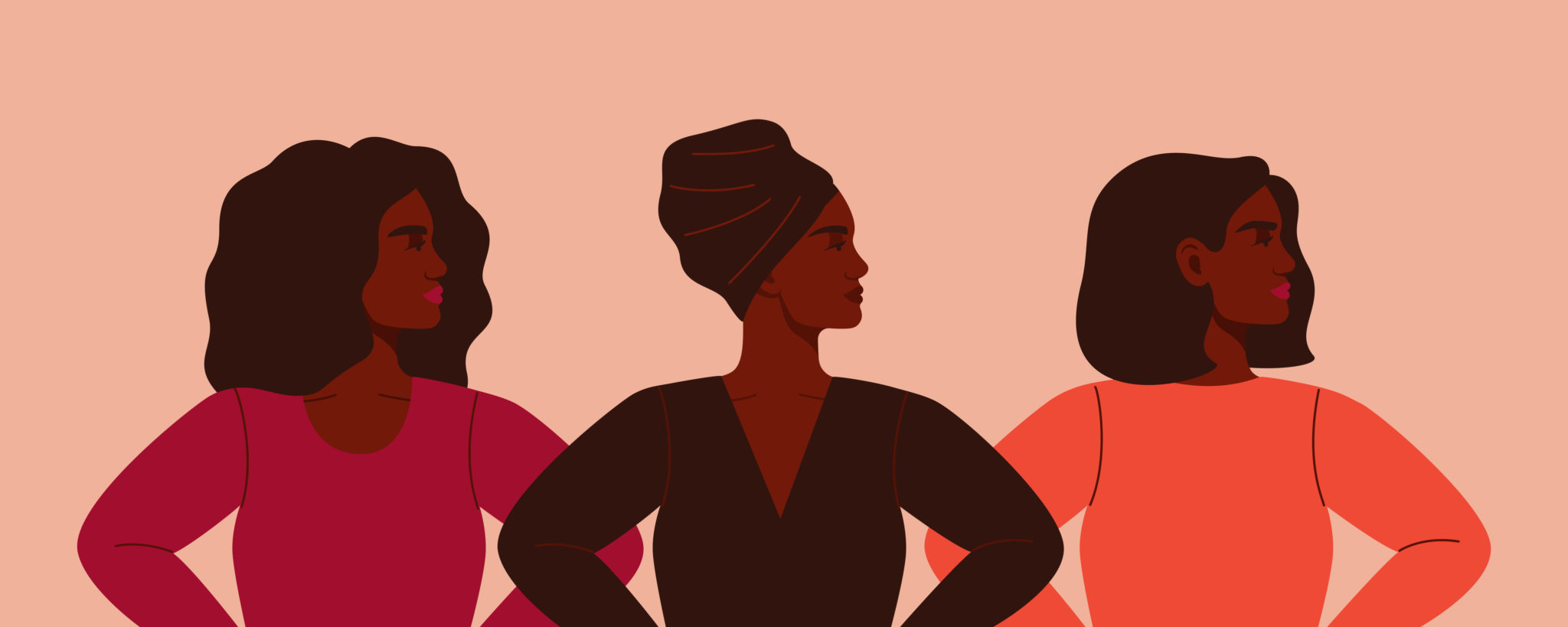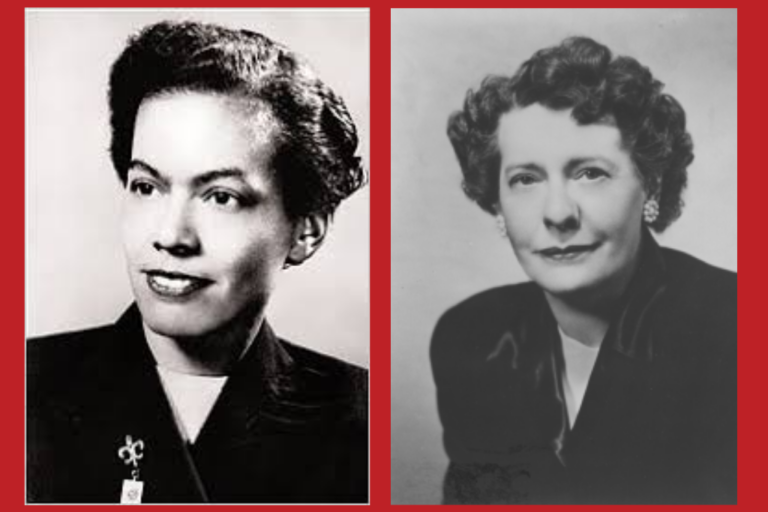In 1920, the 19th Amendment was ratified, giving white women the right to vote.…
Black Herstory: Civil Rights Leaders

We’re back with another edition of Black Herstory, following our first post on Black Suffragists. This time we are focusing on civil rights leaders. Check out some of the women behind the movement below.
Septima Clark, an educator and civil rights activist,
was born on May 3, 1898, in Charleston, South Carolina. After attending public school for her adolescent years, Clark worked to earn enough money to attend the Avery Normal Institute, a private school for African Americans. She graduated in 1916.
After high school, Clark was unable to attend college due to financial constraints. Clark then took a state examination and began working as a school teacher at Promise Land School on John’s Island, South Carolina. After teaching on John’s Island for three years, in 1919 Clark returned to Charleston and taught at the Avery Institute until 1920. During her time at Avery, Clark and her students went door to door collecting signatures in support of Black people having the right to become principals in Charleston public schools, which she achieved. Dedicated to her passion of teaching, Clark continued working with the NAACP to advocate for the integration of public schools, and equal pay for white and Black teachers in Charleston.
Although Black men and women had the right to vote, literacy tests at polls often kept them from exercising their right. Due to the legacy of slavery, many Black men and women were unable to read, leaving them unable to pass the tests. To push back on this, Clark formed her renowned “citizenship schools,” designed to teach Black community members how to read and write, encourage self-pride, and advance knowledge of citizenship rights. Clark’s program initially began while she was directing the Highlander’s Citizenship program, and later was taken over by the Southern Christian Leadership Conference, with over 800 citizenship schools created.
Septima P. Clark passed away in South Carolina on December 15, 1987.
Constance Baker Motley (1921 to 2005)
Constance Baker Motley, a politician and civil rights activist.
was born in New Haven Connecticut on September 14th, 1921. Baker’s parents were immigrants from Nevis, and her mother, Rachel Huggins, was an avid community activist who founded the New Haven chapter of the NAACP. Baker’s interest in Black history began when she read works by James Weldon Johnson and W.E.B. DuBois at age 15. During her later teenage years, Baker began to focus on civil rights and the underrepresentation of Black lawyers after taking a history class with a local minister.
Baker wanted to attend college upon her graduation from high school, but knew that her family could not afford it. While giving a speech at a local community center, Baker caught the attention of Clarence Blakeslee, a white philanthropist who wanted to fund her education. Baker then attended Fisk University for a year and a half, but later transferred to New York University in 1942 after experiencing a racial incident on a train. Baker graduated from New York University in 1943 and received her law degree from Columbia University in 1946.
While completing her law degree at Columbia, Baker joined the Legal Defense and Educational Fund of the NAACP, working closely with Thurgood Marshall. Baker was an integral part of the landmark Brown v. Board of Education decision, helping to write briefs for the case. In addition to this, Baker tried cases in front of the Supreme Court, one of which resulted in James Meredith’s historic admission to the University of Mississippi, the first Black student to do so. Baker went on to win nine civil rights victories during her time as counsel for the NAACP.
In 1964 Baker became the first African American woman elected to the New York State Senate. In 1965, Baker was elected President of the Borough of Manhattan, becoming the first woman to hold this office. The following year, President Lyndon B. Johnson nominated Baker to the U.S. District Court for the Southern District of New York, making her the first Black woman to be appointed to a federal judgeship.
Baker died on September 28th, 2005 in New York City.
Gloria Richardson (1922 to 2021)
Gloria Richardson, an American civil rights activist best known for her role in the Cambridge Movement on Maryland’s Eastern Shore.
Gloria Richardson was born in Baltimore, Maryland on May 6th, 1922. Richardson’s mother was a part of the affluent St. Clair family of Cambridge, Maryland. Richardson’s grandfather owned a successful grocery store and was elected to the Cambridge City Council, where he was the only Black member. Richardson attended Howard University at age 16, graduating with a B.A. in Sociology in 1942. Richardson then went to work for the government during World War II after she struggled to find a job in social work, as agencies at the time wouldn’t hire a Black social worker.
Richardson began her legacy in the civil rights movement when she joined her daughter Donna in protests against segregation and racial inequity in Maryland. She assisted in the founding of the Cambridge Nonviolent Action Committee, and was later chosen to lead the organization. In addition to advocating for desegregation, Richardson advocated for economic justice including: adequate jobs, schools, housing, and healthcare. Richardson was often told by male civil rights leaders to compromise on her strong stances, which she refused.
Richardson died in New York on July 15, 2021.
Judy Richardson (1944 to present)
Judy Richardson, a documentary filmmaker and civil rights activist.
was born on March 10th, 1944 in Tarrytown, New York. After graduating from Sleepy Hollow High School in 1962, Richardson went to Swarthmore College on a full, four-year scholarship. While at Swarthmore, Richardson and other student activists bussed to Cambridge, Maryland to assist with protests over the desegregation of public schools.
After her college years, Richardson joined the Student Nonviolent Coordinating Committee (SNCC) staff at the national office in Atlanta. While there, she worked closely with other civil rights activists, some including James Forman, Ruby Doris Smith-Robinson, and Julian Bond. Richardson then relocated to Mississippi during Freedom Summer of 1964. The following year, Richardson became Julian Bond’s office manager during his successful run for the Georgia House of Representatives.
Richardson and other former SNCC staffers founded what would become the largest Black bookstore in the country, Drum and Spear Bookstore, in 1968. Richardson then became the children’s editor for the Drum and Spear Press, a publishing company she started with the bookstoreand later wrote an essay on racism in Black children’s books that was published in Howard University’s Journal of Negro Education.
Richardson went on to serve as a senior producer for Northern Light Productions in Boston, producing documentaries focusing on historical Black events. She also served as Brown University’s Distinguished Visiting Lecturer of Africana Studies. Richardson continues to lecture and write on the civil rights movement and its connection to current issues.






